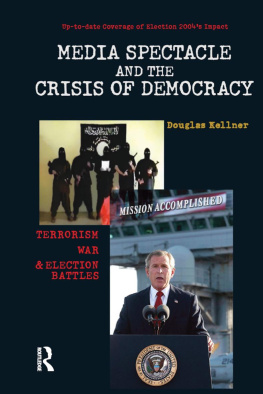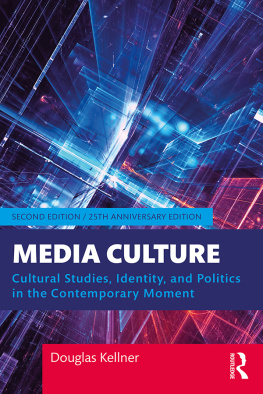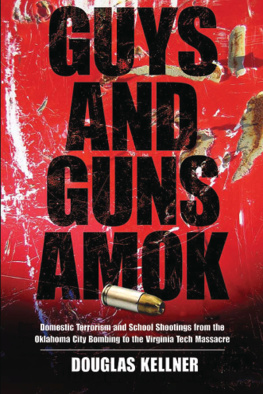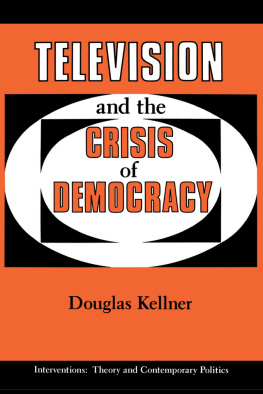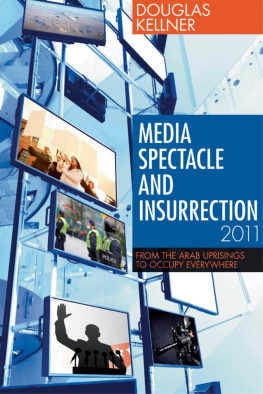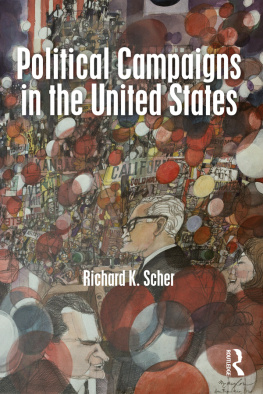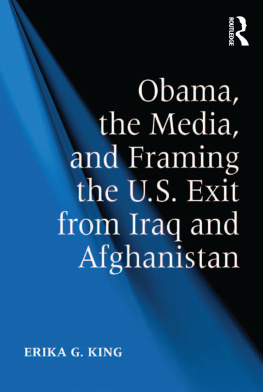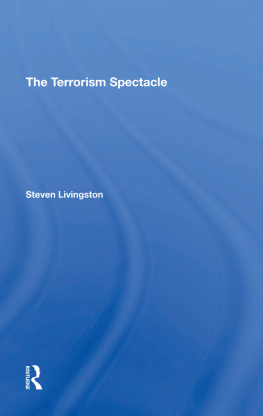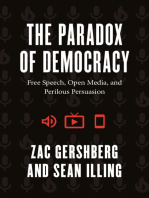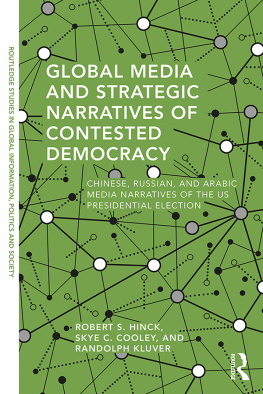Media Spectacle and the Crisis of Democracy
ALSO BY DOUGLAS KELLNER
Herbert Marcuse and the New Left, edited with introduction (2004)
Fredric Jameson: A Critical Reader, coedited with Sean Homer (2004)
From 9/11 to Terror War: The Dangers of the Bush Legacy (2003)
Media Spectacle (2003)
Grand Theft 2000: Media Spectacle and a Stolen Election (2001)
The Postmodern Adventure, coauthored with Steven Best (2001)
Media and Cultural Studies: Key Works, coedited with Gigi Durham (2001)
Herbert Marcuse: Toward a Critical Theory of Society, edited (2001)
Film, Art, and Politics: An Emile de Antonio Reader, coedited with Dan Streible (2000)
Herbert Marcuse: Technology, War, and Fascism, edited (1998)
The Postmodern Turn, coauthored with Steven Best (1997)
Articulating the Global and the Local: Globalization and Cultural Studies, coedited with Ann Cvetkovich (1996)
Media Culture: Cultural Studies, Identity, and Politics between the Modern and the Postmodern (1995)
The Persian Gulf TV War (1992)
Postmodern Theory: Critical Interrogations, coauthored with Steven Best (1991)
Television and the Crisis of Democracy (1990)
Critical Theory, Marxism, and Modernity (1989)
Jean Baudrillard: From Marxism to Postmodernism and Beyond (1989)
Camera Politica: The Politics and Ideology of Contemporary Hollywood Film, coauthored with Michael Ryan (1988)
Herbert Marcuse and the Crisis of Marxism (1984)
Media Spectacle and the Crisis of Democracy:
Terrorism, War, and Election Battles
Douglas Kellner
First published 2005 by Paradigm Publishers
Published 2016 by Routledge
2 Park Square, Milton Park, Abingdon, Oxon OX14 4RN
711 Third Avenue, New York, NY 10017, USA
Routledge is an imprint of the Taylor & Francis Group, an informa business
Copyright 2005 by Douglas Kellner
All rights reserved. No part of this book may be reprinted or reproduced or utilised in any form or by any electronic, mechanical, or other means, now known or hereafter invented, including photocopying and recording, or in any information storage or retrieval system, without permission in writing from the publishers.
Notice:
Product or corporate names may be trademarks or registered trademarks, and are used only for identification and explanation without intent to infringe.
Cataloging-in-Publication Data for this book is available from the Library of Congress.
Designed and Typeset by Straight Creek Bookmakers.
ISBN 13: 978-1-59451-118-9 (hbk)
ISBN 13: 978-1-59451-119-6 (pbk)
Something is rotten in the state of Denmark.
Shakespeare, Hamlet
American fascism will not be really dangerous until there is a purposeful coalition among the cartelists, the deliberate poisoners of public information, and those who stand for the K. K. K. type of demagoguery.
Henry Wallace, The Dangers of American Fascism, New York Times, Sunday, April 9, 1944
If this were a dictatorship, itd be a heck of a lot easier, just so long as Im the dictator.
George W. Bush, December 18, 2000
They took from us everything they could steal.
Bob Dylan
Contents
T HE BUSH-CHENEY YEARS have been among the most contentious in modern U.S. history. The Bush-Cheney administration, seen as illegitimate by many who believe the 2000 election was stolen, veered hard to the right from the beginning, pursuing an agenda of massive tax breaks for the rich, deregulation in favor of the corporations that funded its campaign, and a right-wing social agenda in the interests of the conservative groups that make up its base. Before the September 11, 2001, terrorist attacks, the administrations extremism was being contested and Bushs approval ratings were rapidly declining. After 9/11, the Republicans rallied Americans to their war on terror, their curtailment of civil liberties and democracy in the USA Patriot Act, and their invasion of Iraq, which they claimed was part of the war on terror.
Once upon a time, Republicans stood for corporate fiscal responsibility and economic rationality. Yet the Bush-Cheney clique robs as much national treasure for its contributors as possible, eliminating regulations and rules that increase fairness and efficiency, and undoing social programs that benefit poor and working people. When Bush ran for president, he campaigned as a compassionate conservative and a uniter, not a divider. Yet George W. Bush has proven to be one of the most divisive presidents in U.S. history, and has pursued extremist and hard-right policies that are neither compassionate nor conservative. Although conservatives at one time cherished the values of truth and accountability, Bushspeak involves systematic deceit, using the tactic of repeating a lie over and over again until the public believes it; despite manifestly failed policies and criminal fiscal irresponsibility, there have neither been apologies nor accountability, as I will demonstrate in the following chapters.
Following the September 11, 2001, terrorist attacks, the aggression and militarism of the Bush-Cheney regime was brazen on the global scale. After military intelligence discerned that the Taliban in Afghanistan was harboring Al Qaeda, the Pentagon unleashed its military machine to destroy that fundamentalist Islamic regime. But since the Bush administration and Pentagon deployed a unilateralist, largely air-war strategy, which relied on the purchase of local warlords to fight on the ground, the leaders of the Taliban and Al Qaeda, including Osama bin Laden and Mullah Omar, got away. No matter. The Pentagon militarists and their White House allies had bigger targets in mind: Saddam Hussein and Iraq, which holds the second-largest reserve of oil in the world. Bush administration Treasury Secretary Paul ONeill told Ron Suskind (2004) how George W. Bush was intent on invading Iraq from the beginning of his administration, and antiterrorism czar Richard Clarke (2004) documented how the pre9/11 Bush administration paid little attention to the dangers of terrorism and was obsessed with attacking Iraq. The invasion of Iraq produced a vast bounty of contracts for the military-industrial sector, among which was the Carlyle Group, with whom George H. W. Bush and Bush family consigliore James Baker were involved. Contracts were also given to Halliburton, the corporation of which Dick Cheney was formerly CEO. Cheney pushed fiercely for the war on Iraq, and his corporate allies were well rewarded for his efforts, receiving multibillion-dollar no-bid contracts.
To get away with this banditry, Bush and Cheney needed a compliant populace. In the hysteria following the 9/11 terrorist attacks, they passed with the support of a compliant Congress the USA Patriot Act, through which they could suspend constitutional rights, imprisoning people without legal representation or trial, tapping phones, breaking into houses, and even summoning lists of books checked out in libraries. The administration devised a category of enemy combatant to allow them to arrest and throw in prison without due process anyone they deemed a threat to national security (Cole 2003). In their wars in Afghanistan and Iraq, the Bush administration and Pentagon put aside decades of military law, proclaimed the Geneva Conventions irrelevant, and allowed harsh interrogation procedures that created one of the biggest scandals in U.S. military history when the Abu Ghraib prison abuse pictures from Iraq circulated globally and other examples of U.S. abuse and torture of prisoners surfaced (Hersh 2004).

